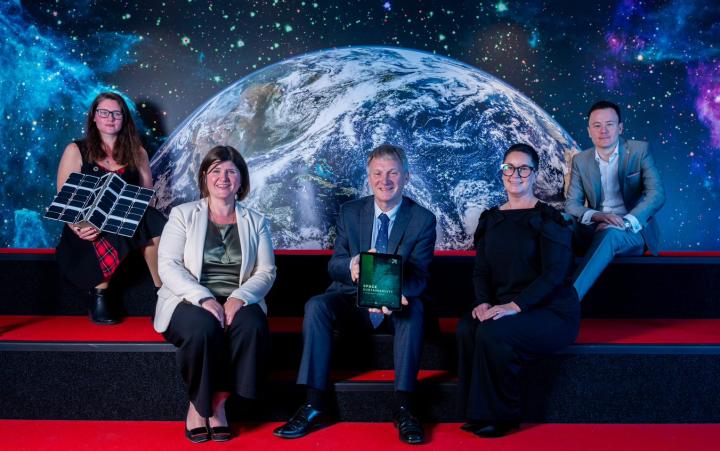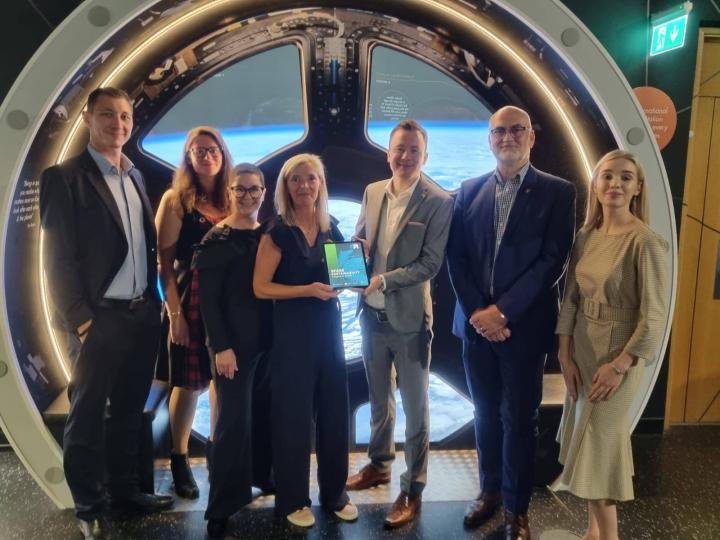Bayes Centre News: World Space Week: Interview with our Space Sector Business Development Lead, Kristina Tamane
World Space Week takes place from 4th – 10th of October. This year the theme is Space and Sustainability. To celebrate World Space Week, we interviewed our Space Sector Business Development Lead, Kristina Tamane, to find out what World Space Week means to her.
World Space Week 2022
This year’s theme for World Space Week is Space and Sustainability. What does this mean to you?
Space and Sustainability is an area that I’m very closely familiar with. I Co Chair the Environmental Task Force for Space Scotland with my colleague Daniel Smith and our duty in that is to make sure the space sector in Scotland but also the UK is sustainable by design.
When we talk about sustainability and space, it's very much end to end for us. So we look at both using earth observation data and using space to help the Earth itself. So combatting things from climate change and making sure we are not overusing Earth’s resources.
It is also sustainability in the near Earth environment. It is very important to make sure that the low earth orbit (LEO) and the orbits around the Earth are protected from space debris and space collision. The work we are doing with the Environmental Task Force is very much looking at both of those aspects but also looking at the knock on effect of the space sector and the space sector supply chains. The space sustainability for us in Scotland is a very big issue.
One of things that we think we can do that no one else can so far in the world is we can make a really green sustainable space nation in Scotland. We are looking to lead the world in terms of sustainability and have just published the world’s 1st Sustainable Space Roadmap. Find out more about this here.
We are also looking at a transparent sustainability kitemark to ensure everyone can be sustainable in their space activities if they wish.

We are working to make sure that the information in there becomes widely accepted and we are working hard to drive some key actions, activity and projects to deliver on our roadmap. I am proud to say that work has already begun. It is a big thing and is something that the University of Edinburgh is particularly well positioned to do because we have got lots of experts across the different sections of the end to end sustainability who work with industry and are world leading themselves.
What would a sustainable space environment look like and how can it be achieved?
I think a sustainable space environment, if we’re speaking about it in near earth orbit, would be well managed globally ideally through some kind of an open network where different states can see what’s up in the near earth environment and ensure that we are not over polluting that area – instead managing it consciously and fairly.
For example, the main law that currently regulates space activities is over 50 years old now so it is not really appropriate anymore. We need to make sure we have got rules and regulations and best practice across the world that is easy to follow and make sure we protect the Earth long term for future generations to come.
I think it’s also very important to use the space data that we have at the moment, to make sure that we are keeping our planet sustainable, combatting climate change and enforcing responsible use of Earth through regulation.

Why is space sustainability important?
Sustainability of space is essential to ensure continuation of services that we use everyday such as GNSS (aka navigation), astronomy, internet and much more.
It is essential that we are responsible users of the space environment and also it’s important for us to be able to use the data that we have to make accurate decisions about actions for sustainability on Earth as well. A University lead project called Data Slipstream is very much spearheading the use of space data and Artificial Intelligence to make those good and qualified decisions about climate change mitigation. That’s where space data really comes into it’s own as it’s actually cheaper and more green to use that data. For example, flying planes to collect the same information because it’s more damaging to the environment and more expensive. So actually space is a good long term solution as long as it's done sustainably and collaboratively.
It's an interesting one, especially with big constellations coming on board with people like SpaceX and Amazon creating their own massive constellations. The near Earth environment is getting very crowded and we need to act now to ensure we do not suffer in the very near future.

